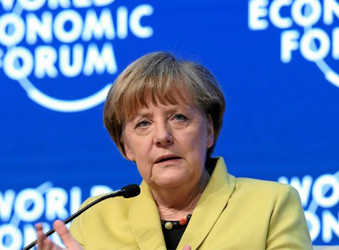German Chancellor Angela Merkel’s conservatives and the Social Democrats (SPD) reached agreement on energy and agriculture on Saturday, but were still in dispute over healthcare during talks to form a government, more than four months after the election.
The two camps aim to seal a deal by the end of Sunday to renew the “grand coalition” that has governed since 2013, although some politicians say they could run into Monday or Tuesday.
Speaking at the end of talks on Saturday, conservative politician Michael Grosse-Broemer said the two blocs intended to stick to the timeframe but issues like labor policy, healthcare and rents still needed to be resolved.
“The coalition treaty is slowly taking shape but we’ll only be able to say with more certainty tomorrow whether it will come to a conclusion,” he said.
SPD deputy Manuela Schwesig urged the conservatives to compromise on abolishing fixed-term contracts for workers and reforming Germany’s public-private healthcare system.
“I don’t think Mrs Merkel can explain why there can’t be any movement there,” she said as she arrived for talks.
The SPD wants to prove to its skeptical members that it would be able to push through those core policies in the role of junior partner to make another “grand coalition” more appealing.
Many of the SPD’s 443,000 members – who will get to vote on any coalition deal – would prefer their party to revamp in opposition rather than join another alliance with Merkel after suffering their worst post-war election result in September.
Healthcare is a big stumbling block and party sources said Merkel and her Bavarian ally Horst Seehofer discussed the issue before meeting the SPD.
Most Germans have public health insurance, but a minority, mainly high earners, have private insurance instead. The SPD wants to replace the system with one insurance system for all, a change the conservatives reject.
Talks are now expected to focus on improving public healthcare, such as by changing billing rules for doctors, who earn more by treating private patients.
The parties are not expected to come to an agreement on the most controversial issues, which include healthcare and labor market policy, until the near the end of negotiations.
The conservatives have offered to ban the repeated renewal of fixed-term contracts but do not want to prevent employers from using them as the SPD demands.
The two camps made some progress on labor policy on Friday by agreeing that employees in companies with more than 45 workers should have the right to move seamlessly back and forth between full- and part-time employment.
ENERGY AND FARMING
In a sign they are getting closer to a deal, the parties reached an accord on energy and the environment, agreeing to set legally binding climate targets for sectors like energy, transport, agriculture and construction to reach by 2030.
Environment Minister and SPD member Barbara Hendricks said national climate targets for 2020 would not be quite reached but the new targets, which would be written into law in 2019, would ensure Germany can remain a “climate protection pioneer”.
They also agreed on agriculture, saying they wanted to put an end to the use of weedkiller glyphosate as quickly as possible and ban the cultivation of genetically modified plants.
They reached a deal on migration on Friday, agreeing to stick to the wording of January’s coalition blueprint that said the parties did not expect annual migration to exceed 220,000 per year.
But the two blocs were still wrangling over its meaning on Saturday, with Joachim Herrmann – a member of Merkel’s CSU Bavarian allies who have called for an upper limit – telling the Rheinische Post his party had secured a migrant cap.
SPD deputy Ralf Stegner said the number was merely a prediction, writing on Twitter: “The fact remains that the SPD has not agreed to any upper limit and will not do so.”
Migration is a sensitive issue given the influx of more than a million migrants since mid-2015 and the conservatives’ subsequent loss of support to the anti-immigrant Alternative for Germany (AfD) in September’s national election.
source:Reuters
